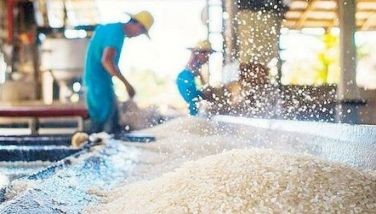Pork, sugar and corn

We have written about oil, gold, and industrial metals in past articles. Let us now look at agricultural or soft commodities. After many years of stability, prices of pork, sugar, corn, and other agri products are surging. These are due to the anticipation of global economic reopening, concerns about inflation, and supply constraints.

Hogging the limelight
Pork has been in the limelight lately. This is because of the dwindling supply and rising prices of pork in the market. Pork prices have increased not only in the Philippines but also internationally, as shown by the chart above. Lean hogs, traded in the Chicago Mercantile Exchange, have spiked 38 percent year-to-date. This increase is due to a combination of higher global hog prices and the continued African swine fever (ASF) epidemic that decimated the livestock of many countries, including the Philippines. Pork is the favorite meat of Filipinos and a most important source of protein.
Corn prices leading the way
While most eyes are on pork prices, other agricultural commodities are rallying this year as well. The Bloomberg commodities agriculture sub-index is up 23.4 percent this year. This is its highest level since 2016. Corn has led the rally among soft commodities, rising 51.8 percent year-to-date and 117 percent year-on-year. Strong demand from China is driving global corn prices higher. Its corn imports are expected to hit a record this year as they replenish pig herds recovering from the ASF.
Rising agricultural commodity prices
China has also stepped up its importation of wheat, soybean, sugar, and other agricultural commodities this year. Soybean and wheat reached their highest settlements since 2013, up by 85.2 percent and 35.8 percent year-on-year, respectively. Meanwhile, sugar rose 69 percent over the same period. There is increasing global demand for these agricultural products as restaurants reopen. This demand is more pronounced in China, leading the world in the recovery from the pandemic. Meanwhile, the ongoing drought in Brazil, a major exporter of corn, sugar, wheat, and soybeans, adds to the supply woes.

Compromise pork tariff cut
Because of the high prices and tight supply of pork, the National Economic and Development Authority (NEDA) has pushed for lower pork tariffs and increased minimum access volume (MAV) for imported pork. This measure aims to stabilize meat prices, which have been consistently the top contributor to inflation this year. Food inflation rose 4.8 percent in April, with meat inflation surging 22 percent.
After weeks of contentious discussion, the Senate and the country’s economic managers reached a compromise agreement on pork tariff cuts last week. They set the revised tariff rates at 10 percent for in-quota importation and 20 percent for out-quota in the first three months. Then for the remaining nine months, they set it at 15 percent for in-quota and 25 percent for out-quota. BSP Governor Benjamin Diokno said that “the cut in pork import tariff will help address supply constraints and ease price pressures.”
Give it a chance to work
In a statement last week, Rep. Joey Salceda said, “now that EO 128 is law, we must give it a chance to work.” In addition to the tariff cuts and increased pork imports, Salceda proposes long-term solutions that will expand crop insurance for livestock, invest in biosafety facilities, and develop value chains for agriculture. Salceda also urged the Department of Agriculture to help the local swine industry and farmer groups participate in the import market.
Be watchful of food inflation
It is laudable that the country’s economic managers and the Senate reached a compromise agreement last week. This compromise strikes a balance between stabilizing pork prices and safeguarding the local hog industry. But as can be seen in the table of select commodities above, prices have been soaring and food inflation can be a potential problem for our country. Commodity prices are surging due to the expectation of higher inflation, supply issues, the global reopening trade, low-interest rates, and the massive monetary and fiscal stimuli worldwide. In light of this, authorities must continue to be watchful and proactive in addressing food inflation to prevent it from spiraling out of control.
Philequity Management is the fund manager of the leading mutual funds in the Philippines. Visit www.philequity.net to learn more about Philequity’s managed funds or to view previous articles. For inquiries or to send feedback, please call (02) 8250-8700 or email ask@philequity.net.
- Latest
- Trending

























